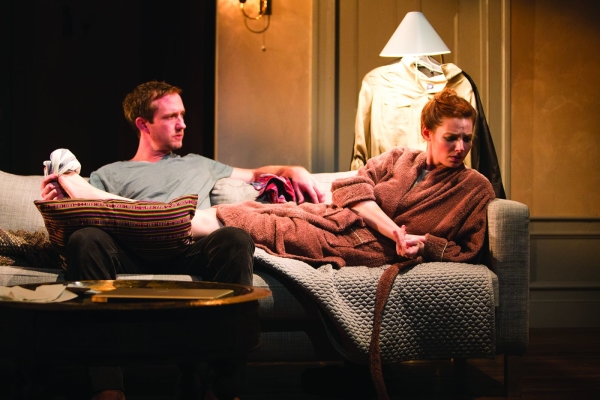
(© Igor Dmitry)
Amy Herzog's Belleville, playing at Washington, D.C.'s Studio Theatre, is in part a study of how difficult it is to know others, even people we profess to love. It is also an examination of what happens when individuals try to live idealized lives in order to avoid reality. With its emphasis on the dark side of human nature, Belleville is at times hard to watch, but it is well-written and credible throughout.
Zack and Abby are a young married couple who have moved to Paris to avoid modern American bourgeois life and trade it for something noble – or at least unconventional. Zack (Jacob H. Knoll) works with Doctors Without Borders, doing research on pediatric AIDS. Abby (Gillian Williams) teaches yoga and studies French. But both of them have brought too much proverbial baggage with them to France. Abby is insecure, still mourning the death of her mother, and very dependent on her father, who lives in America. She is uncomfortable among Parisians, who she thinks "act superior," and she is having a hard time weaning herself from the antidepressants and antianxiety medications she hates.
At the beginning of the play Zack seems to be the perfect young husband. He looks after Abby, both physically and psychologically, treating her mental frailty as carefully as he treats her foot when she stubs her toe and splits her toenail. But it becomes apparent that all is not well in Zack's world, either. He is broke and can face his situation only when high on marijuana. His need to be high increases when Alioune (Maduka Steady), the young French-Senegalese owner of the apartment where Zack and Abby live, tells him he must pay up the four months' rent he owes or move out.
The couple's speedy downward spiral is emphasized by Alioune and his wife, Amina (Joy Jones), who work hard and have children to whom they devote their lives. In their shadow, Abby and Zack look like children nonchalantly playing at life while Alioune and Amina look like grownups. Herzog's noirish treatment of the plot heightens Abby and Zack’s mental devolution and paranoia, morphing the mood from strange to menacing in the play's final moments.
The real Belleville – literally "beautiful town" in French – is no longer an idyllic village. When Herzog established the setting of the play in that run-down, working-class district, she was being heavily ironic. It's the perfect setting to make an American woman nervous about people who scorn her terrible French. Debra Booth's set is a small Parisian garret with French windows, two small skylights, and scruffy, mismatched furniture, straight from a flea market. Peter West's lighting design often throws that set into layers of gray, as befits the noir genre. The sound design, by composer Ryan Rumery, faithfully reproduces certain familiar Parisian sounds from the two-toned wail of police cars, to cooing pigeons, and even a jazzy accordion in an outdoor café.
From the ambient sounds of Paris to the naturalistic rhythms of speech, director David Muse wisely intensifies critical moments by having Zack and Abby speak over each other, their voices rising and gradually amplifying the distrust and tension between them. With an ending that goes beyond noir, this play isn't for the faint of heart. But as acted by the team at Studio Theatre, Belleville is a thriller that takes a brilliant look at doubt, insecurity, and the improbability – even impossibility – of intimacy.








